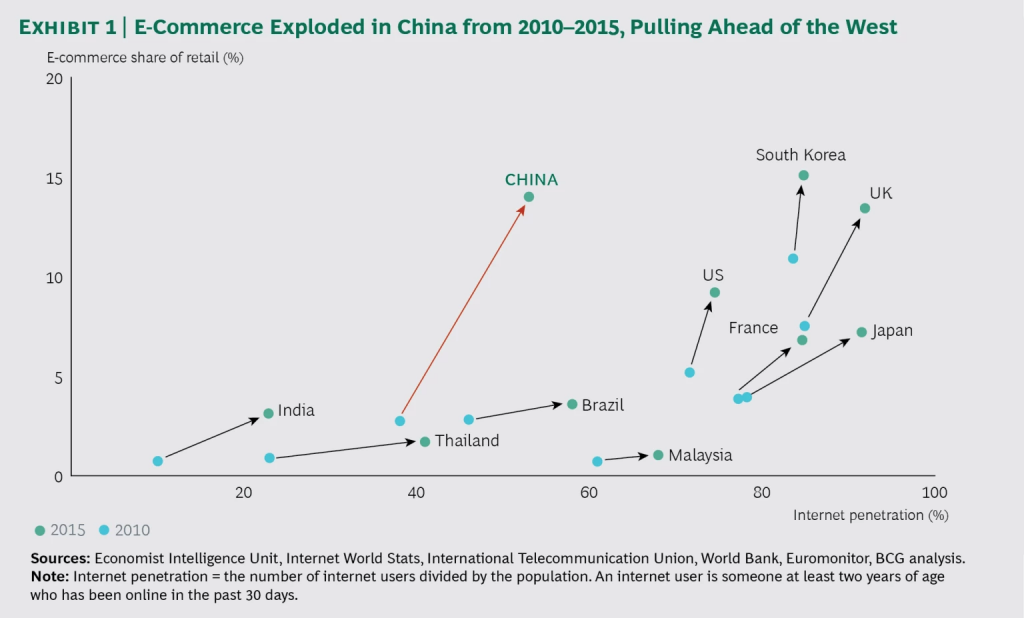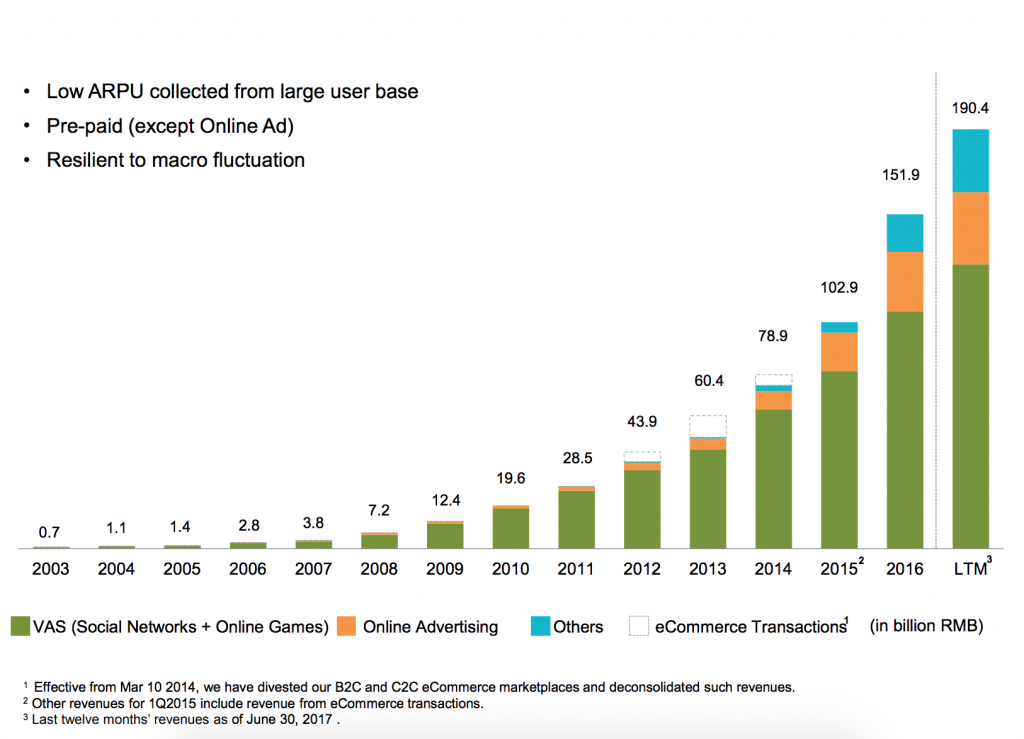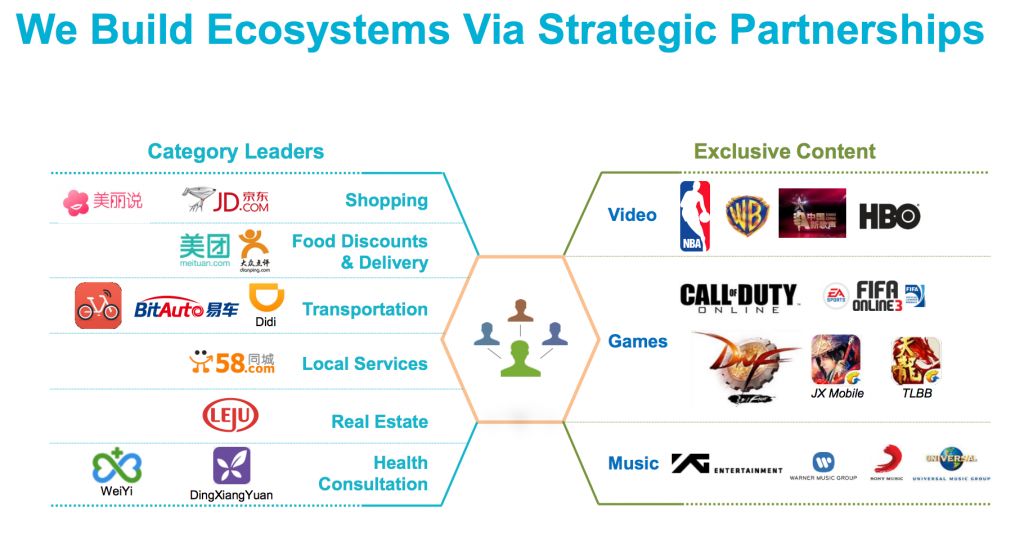 Mit dem überragenden Erfolg von WeChat (gehört zur Tencent Gruppe) in China und der zunehmenden Dominanz asiatischer Anbieter auf amazon.de und ebay.de, möchte ich mich zunehmend dem BATman Phänomen widmen. BATman ist eine Abkürzung für Baido, Alibaba und Tencent, die in Summe in Asien noch dominanter sind als die GAFA (Google, Amazon, Facebook und Apple) bei uns. Anders als bei den bisherigen Analysen bewerten wir bei Tencent nicht das Geschäftsmodell, sondern es dreht sich in dieser Ausgabe eher darum zu verstehen was Tencent eigentlich ist. In dieser Analyse Reihe habe ich bisher Bonobos (zu schnell zu groß), ULTA (Musterbeispiel für stationäre Digitalisierung), Zappos (Am Tropf von Amazon), Farfetch (Das nächste Fab.com), Stitchfix (Ich bin ein Fan!), die Hut Group (altes Geschäftsmodell, aber sehr erfolgreich) und Etsy/DaWanda (Hausgemachte Probleme) betrachtet. Das Material für die Analysen wird von eTribes bereitgestellt – die führende Digitalberatung in Deutschland. Viele von euch kennen eTribes bereits aus den vielen Knut Digital Studien.
Mit dem überragenden Erfolg von WeChat (gehört zur Tencent Gruppe) in China und der zunehmenden Dominanz asiatischer Anbieter auf amazon.de und ebay.de, möchte ich mich zunehmend dem BATman Phänomen widmen. BATman ist eine Abkürzung für Baido, Alibaba und Tencent, die in Summe in Asien noch dominanter sind als die GAFA (Google, Amazon, Facebook und Apple) bei uns. Anders als bei den bisherigen Analysen bewerten wir bei Tencent nicht das Geschäftsmodell, sondern es dreht sich in dieser Ausgabe eher darum zu verstehen was Tencent eigentlich ist. In dieser Analyse Reihe habe ich bisher Bonobos (zu schnell zu groß), ULTA (Musterbeispiel für stationäre Digitalisierung), Zappos (Am Tropf von Amazon), Farfetch (Das nächste Fab.com), Stitchfix (Ich bin ein Fan!), die Hut Group (altes Geschäftsmodell, aber sehr erfolgreich) und Etsy/DaWanda (Hausgemachte Probleme) betrachtet. Das Material für die Analysen wird von eTribes bereitgestellt – die führende Digitalberatung in Deutschland. Viele von euch kennen eTribes bereits aus den vielen Knut Digital Studien.
Wo steht der Markt in China?
Bevor wir zu Tencent kommen, lohnt sich noch mal ein Blick auf den chinesischen Markt, dem wir im E-Commerce Buch ein eigenes Kapitel gewidmet haben. Baidu, Alibaba und Tencent (plus JD.com) haben extrem starke Dominanz aufgebaut im derweil riesigen Internet- und E-Commerce-Markt China. Schon heute macht der der chinesische Onlinehandel 40% aller weltweiten E-Commerce Umsätze aus. Und der Trend soll nicht so schnell abflachen. Heute haben dort 53,2% der Bevölkerung Internetzugang – vor 10 Jahren waren es in Deutschland schon 58% (heute 79%). Allein da ist also noch Raum nach oben.
In China last year, the number of internet users reached 731 million, accounting for 53.2 percent of the country’s entire population. Online shopping consumers reached 467 million, or 63.8 percent of internet users, which also increased 12.9 percent over the end of 2015.
Noch viel spannender ist der rasant wachsenden E-Commerce Anteil am Gesamtumsatz. China führt in dieser Kategorie mittlerweile weltweit die Liste an.

THERE was a time, not that long ago, when China’s big internet companies were dismissed by investors in Silicon Valley as marginal firms with a tendency to copy Western products. Not any more. Today they are monsters with increasingly hefty international ambitions. Western companies usually prefer to focus on a few core areas, whereas Chinese internet firms typically try to do everything from cloud computing to digital payments. When this works, as with Tencent’s wildly successful app, WeChat, the results can be impressive. […] can succeed on a rapid and massive scale because the state-dominated economy is so inefficient. Often there is not even a physical infrastructure to leapfrog—so-called third-tier cities, for example, often lack big retail centres. Nationwide there is one shopping mall per 1.2m people.
Welche Rolle spielt Tencent bei dieser Entwicklung?
Tencent hat vor allem durch WeChat eine Plattform aufgebaut, die dem Endverbraucher so viele Services bietet dass über ein Drittel der knapp 1 Mrd User über 4 Stunden mit dem Service am Tag verbringen.
WeChat now has 937.8 million active users, more than a third of whom spend in excess of four hours a day on the service. To put that in context, consider that the average person around the world spends a little more than an hour a day on Facebook, Instagram, Snapchat, and Twitter combined.
Sich selbst beschreibt Tencent wie folgt:
Founded in November, 1998, Tencent is a leading provider of Internet value added services in China. Since its establishment, Tencent has maintained steady growth under its user-oriented operating strategies. On June 16, 2004, Tencent Holdings Limited (SEHK 700) went public on the main board of the Hong Kong Stock Exchange. It is Tencent’s mission to enhance the quality of human life through Internet services. Presently, Tencent provides social platforms and digital content services under the “Connection” Strategy. Tencent’s leading Internet platforms in China […] have brought together China’s largest Internet community, to meet the various needs of Internet users including communication, information, entertainment, financial services and others […]. The development of Tencent has profoundly influenced the ways hundreds of millions of Internet users communicate with one another as well as their lifestyles. It also brings possibilities of a wider range of applications to China’s Internet industry.
Ein paar Fakten:
- Gegründet 1998 vom Medien-scheuen Pony Ma, IPO 2004
- Anfangs vor allem durch den ICQ-Klon “OICQ” (heute QQ) User gewonnen
- Naspers hat 2001 einen 46,5% Anteil von Tencent gekauft (hat heute noch ca 30%)
- Hat dann viel in Online- und Mobile Gaming investiert und generiert hier die meisten Umsätze
- Investiert seit einigen Jahren sehr stark in verschiedenste Online-Bereiche und hat sich ein exzessives Portfolio an Services und Beteiligungen aufgebaut
- Die meist genutzten Social Networking Services sind WeChat, QQ und Qzone, außerdem dominiert Tencent den asiatischen Gaming Markt und hat im Bereich Content mit 600 Mio Usern den weltweit größten Musik Streaming Service (Spotify hat 140 Mio User)
- Über 50% der Mitarbeiter sind im R&D angestellt
- Deren Umsatz verteilt sich zu 65% auf Gaming, Social Networking und Media (eigene News, Musik und Videostreaming Formate), 18% Online Advertising, 17% other (vor allem Payment wächst hier exrem stark, aber auch Cloud und Internet Services wie Security software, email, map, image processing, …)
- Alles dominierender Kern von Tencent ist WeChat
The new number 1 among the online business giants is the Chinese company Tencent , established in 1998, which was able to gain by 19% [in 2016]. Their portfolio contains, among other services, Asia’s most used messenger service WeChat . Its WeChat Wallet is furthermore the most extensively used mobile payment system in China. For a few months, Tencent was even the most valuable among all of China’s companies, before e-commerce giant Alibaba superseded it again near the end of the year.

Der Geschäftsbericht ist recht aufschlußreich. Mit 23 Mrd. $ Umsatz 2016 und knapp 400 Mrd. $ Market Cap. ist bereits viel Phantasie in der Aktie, aber daraus folgt eher, dass die Aktionäre Tencent mit Facebook vergleichen und nicht so sehr mit Amazon.
Was genau ist die Strategie von Tencent?
Ich bin mir gar nicht sicher, ob Tencent von Anfang an klar war wie weit die Reise mit WeChat gehen kann, daher poste ich hier gerne erneut ein Video, mit dem sich das Potential von WeChat besser erkennen lässt.
WeChat ist das chinesische Internet zurzeit. Desktop Angebote sind nicht ansatzweise so ausgereift wie mobile Angebote und das macht es besonders spannend auf China zu schauen. Die Liste der Services die bereits in WeChat integriert sind bzw. bald werden lässt Whatsapp erblassen. Dabei geht es nicht nur um private Angebote, sondern aus um Services rund um den Arbeitsplatz.
- The app, called Weixin in Mandarin Chinese and operated by Chinese web giant Tencent, is already a phenomenon in its own right. It lets people send instant messages and post about personal events, while incorporating functions like ride hailing, buying movie tickets, sending payments, settling utility bills as well as online shopping. WeChat, which now has more than 800 million users, is essentially a portal of web services that an average Chinese checks about 10 times a day. Last year, HSBC valued the app at $83.6 billion, about half of the market capitalization of the Hong Kong-listed Tencent.
- More than 20 million office workers now apply for leave, file for reimbursement and track project progress through WeChat’s enterprise accounts, which are special built-in accounts that Chinese companies open for their employees, Tencent said during an analyst call on Wednesday. In addition to common features such as file transfer and group call, the accounts offer customized functions for different bureaus and firms.
- Supermarket chain Meiyijia, for example, added functions where employees can report inventories while the Beijing Institute of Technology allows its students and professors to check performance and pay school fees through its account, according to the website of WeChat enterprise account. Companies can also offer customers virtual membership cards through WeChat, where consumers can scan each time they make a purchase to accumulate reward points.
Um diese Dominanz im privaten Umfeld und am Arbeitsplatz zu erhalten und auszubauen, investiert Tencent wie kaum ein zweites Unternehmen weltweit.
Tencent is also making bold acquisitions abroad. A consortium that it led spent $8.6bn to acquire Finland’s Supercell last year, a deal that turned Tencent into the world’s biggest purveyor of online games. Together with Taiwan’s Foxconn, a contract-manufacturing giant, the firm invested $175m last year into Hike Messenger, an Indian messaging app akin to America’s WhatsApp. It was also an early investor in America’s Snapchat, another popular messaging app, whose parent company Snap went public in March.
Die Tencent Strategie könnte man im folgenden Bild durchaus als reine Plattformstrategie verstehen. Kundenzugang kontrollieren & Content Distribution managen.

Was hat das alles mit E-Commerce zu tun?
Es hat vor allem etwas mit dem Verständnis zu tun, was E-Commerce überhaupt ist.
#1 Tencent hat seine eigenen Shops eingestellt, ist aber wohl der nach Alibaba wichtigste E-Commerce Akteur in China.
At the same time, the company was also learning how to cut its losses and play to its strengths. In 2013, Tencent gave up on its floundering search business, turned it over to a competitor, Sogou Inc., and invested $448 million in Sogou instead. The following year it sold its equally unsuccessful e-commerce initiative to JD.com Inc. and invested $214 million in JD for a 15 percent stake. Before these deals, Tencent “was involved in everything,” says Zhang Lei, founder and CEO of Hillhouse Capital Group and an early JD.com and Tencent investor. After the deals, “it only focused on what it did best and entrusted other sectors to partners.”
#2 Durch die Beteiligung an JD.com partizipiert Tencent direkt an der krassen E-Commerce Entwicklung in China
JD.com is developing to become an ecosystem similar to the one of Amazon, it is a real opportunity for foreign brands to position itself on this online store to develop its reputation and brand awareness in the Chinese market. The platform is considered to be the biggest online direct selling website. The company owns and operates seven execution centers and 166 warehouses in 44 cities. It also has about 4,000 delivery stations in China and makes it a company with a strong distribution network.
#3 Viel wichtiger als JD.com ist sind die diversen Shopping Services von Tencent
With more than 938 million monthly active users at the end of the first quarter of 2017 and accounting for 29 percent of mobile app utilization in China, WeChat is hands down China’s leading super app. One of the reasons for WeChat’s popularity is the ability to make online purchases. In 2016 more than 30% of WeChat users made purchases on the platform compared to just 15% in 2015. Today, more and more brands are looking to sell on WeChat. Some luxury brands like Swarovski, Dior and Longchamp have taken the plunge. WeChat is no longer a choice but a necessity for brands that want to sustain their growth in China. Earlier this year, WeChat introduced Mini programs on the platform, a game changer that will reshape the current WeChat e-commerce standard.
#4 Mit diesen Services wird Tencent nun wichtigster Gegenspieler von Alibaba, während Amazon.com in den USA keinen solchen Gegner hat (Der Artikel ist zwar aus 2014, aber mE noch immer sehr aktuell)
Until recently, Alibaba and Tencent seemed largely content to develop their own areas of expertise without moving too aggressively onto each other’s turf. Alibaba owns e-commerce sites like Taobao and Tmall, while Tencent operates messaging services like QQ and WeChat. But over the last year or so, with Alibaba positioning itself for an initial public offering and Tencent eyeing the lucrative earnings from the boom in online retailing in China, the gloves have come off. “Tencent is absolutely trying to get more aggressive in the e-business space, challenging Alibaba, as most of their services are now overlapping,” said Bryan Wang, an analyst at Forrester Research. In October, Jack Ma, the chairman of Alibaba, announced that he was shutting down his WeChat account and moving to a new Alibaba messaging service called Laiwang. He urged his followers to do the same. The video game market in China increased 38 percent last year, to $13.8 billion, according to a government agency that monitors the industry. Mobile games were the fastest-growing segment, with revenue more than tripling to $1.8 billion. E-commerce is a much bigger business. Last year, sales in China, including online transactions between businesses, rose to $335 billion from $221 billion in 2012, according to an Alibaba research center. Tencent said the agreement with China South City would enhance its e-commerce reach. The companies will work together to help small and midsize companies develop their online retailing operations, they said.
Wann kommt Tencent (oder Alibaba) nach Europa?
Diese Frage wird mir im Bezug auf BATman am meisten gestellt und darauf gibt es nur sehr vage Antworten. Zum einen ist das Wachstum in China noch so stark, dass der relativ komplizierte europäische Markt im Vergleich zum Inlandswachstum gar nicht so spannend ist. Auf der anderen Seite rechne ich nicht damit, dass es eine Art JD.de geben wird, sondern erwarte den Marktzugang eher im Rollout der WeChat Plattform. Die aktuelle WeChat Variante für Europäer ist mit der chinesischen Variante nicht vergleichbar.
Tencent’s stock had risen to make it the most richly valued company not only in China, but in all of Asia—a record it now trades back and forth with its archrival, Alibaba Group Holding Ltd Where the company wants to go, eventually, is outside its home market. Tencent, which is based just north of Hong Kong in Shenzhen, permeates daily life in China. More than two-thirds of Chinese people use its two messaging apps, WeChat and QQ, for everything from texting to shopping, flirting, dating, watching videos, playing games, and ordering food and taxis. According to venture capitalist Mary Meeker, Chinese users collectively spend 1.7 billion hours a day on Tencent apps, more than they spend on all other apps combined.
Abgesehen davon, könnte Tencent auch einfach ein paar europäische oder US Unternehmen kaufen, um in den Markt zu kommen. Ebay wäre da mE ein Kandidat, oder Mediamarkt.
With record success at home, WeChat once again sets its sights on global expansion, partnering with Silicon-valley-based mobile payment startup Citcon to bring WeChat pay to the US. The partnership will effectively enable millions of American retailers to leverage the influx of Chinese travelers whose spending is expected to surpass $80 billion by 2020. The Citcon partnership is a notable development for the Chinese tech giant. Earlier efforts by WeChat to expand into new markets have been largely fruitless, including large-scale marketing campaigns in Europe, India and South America. In 2013, WeChat recruited soccer superstar Lionel Messi for a series of TV and internet ads, yet failed to build a significant user base abroad.
Aus der Ferne ist die Strategie von Tencent schwer zu bewerten und ich rechne fest damit, dass wir von Tencent vor allem als Investor in den nächsten Jahren in Europa hören werden. Die Tencent Bewertung an der Börse ist gigantisch, Geld ist billig und der chinesische Markt wird bald sogar für solche Riesen nicht mehr groß genug sein. Das dürfte im westlichen Ökosystem einiges durcheinanderbringen.
Der nächste Kandidat für die Kassenzone Analyse ist die Wish, gefolgt von Mediamarkt Auch dafür wird das Analysematerial von eTribes bereitgestellt – eine der führenden Digitalberatungen in Deutschland. Viele von euch kennen eTribes bereits aus den vielen Knut Digital Studien. Weitere Vorschläge für neue Analyseziele gibt es im Whatsapp Kanal.

